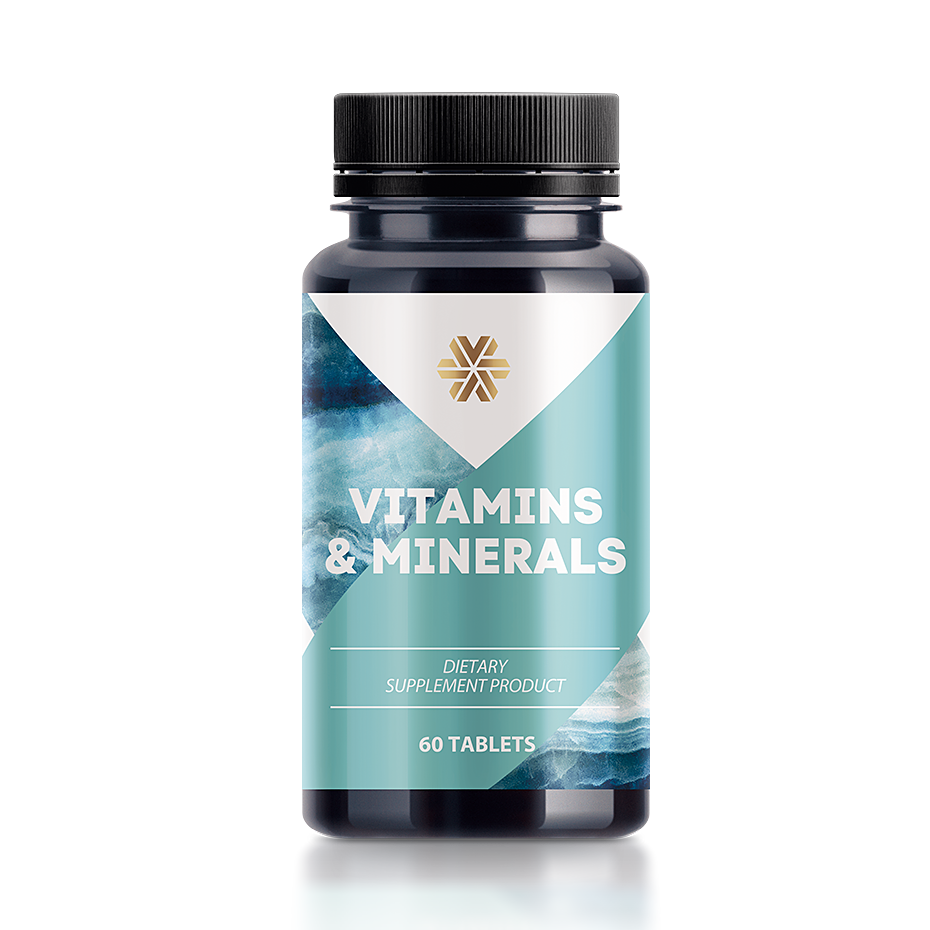Dietary Supplement Product - Vitamins & Minerals, 60 tablets
The formula of 13 vitamins and 8 minerals will provide the body with essential nutrients, which are vital during vigorous physical activity.
Item number: 501198
Количество в упаковке: 60 tablets
Best before: 15.01.2026
Remain: 100+ pcs.
476 ฿
560 ฿
13.6 pts.
About product
The complex with a high content of iron, magnesium and calcium contains the most complete set of all the necessary micronutrients and is suitable for both athletes and anyone who leads an active lifestyle!
13 essential vitamins contribute to the gain of muscle mass, provide maximum effect from training increasing endurance.
8 vital minerals help form muscle relief and increase athletic performance.
Meet the team of the most important vitamins and minerals!
Multivitamins
Plays an important role in the creation of new muscle cells.
Defines the performance of the entire musculoskeletal system of muscles, bones and nerves.
Improves blood microcirculation, prevents blood clots, takes part in blood formation, regulates protein metabolism preserving muscle activity, preventing fatigue.
Participates in all types of metabolism and is necessary for the transmission of a nerve impulse. With its deficiency, muscle cells will not be able to respond to signals from the nervous system.
Ensures optimal use of protein in the body by regulating the processes of tissue growth and reconstruction. It improves muscular activity when exercising and is essential for healthy skin, nails and hair growth.
Vitamin B6 helps form the main energy molecule in our body – ATP, so it helps increase productivity and endurance during physical exertion. Protein synthesis, muscle growth and carbohydrate utilization are only possible with pyridoxine.
Participates in protein synthesis and hematopoiesis, improves sports performance, and stimulates active work of all muscle groups. Essential for the synthesis of neurotransmitters that regulate emotions, thinking processes, and memory.
Helps the body recover faster from exercise, improve performance and avoid injury.
Regulates blood coagulation and oxidation-reduction processes, ensures protein synthesis that retains calcium in bone tissue, prevents the development of osteoporosis.
Participates in 60+ metabolic reactions related to energy production, increases endurance and improves muscle nutrition by increasing blood flow.
Participates in protein synthesis including in muscle tissue, provides hematopoiesis, nutrition and oxygen supply to muscles.
Essential for all types of metabolism. The processes of lipolysis (the combustion of fatty acids to produce clean energy) and the synthesis of adrenal glands hormones (which are necessary for an adequate body response to stress) are impossible without pantothenic acid.
Plays an important role in amino acid metabolism and the processes that provide energy to muscles. Biotin deficiency can cause slow growth of muscle mass.
Minerals
Essential for the processes of hematopoiesis, synthesis of collagen and elastin (the main proteins that support the structure of organs and tissues). It provides fast and high-quality conduction of nerve impulses, participates in the synthesis of hemoglobin, activates blood flow.
Supports thyroid function, which hormones (thyroxine, triiodothyronine) regulate all types of metabolism in the body, primarily energy, which helps reduce body fat percentage and increase workout intensity.
Essential for the hemoglobin formation, the main protein that transports oxygen from the lungs to all cells of the body. It is a part of myoglobin, the main protein of muscle tissue.
Essential for the normal growth and metabolism of connective tissue, as it participates in the synthesis of collagen. It has an antioxidant effect.
Shields cell membranes from oxidative processes, thereby protecting them from destruction. Supports the work of the heart muscle, providing strength and rhythm of heart contractions.
Important for gaining muscle mass, as it is part of anabolic hormones, which have a major influence on athletic performance. Strengthens the immune system, participates in the synthesis of adrenal hormones and spermatogenesis.
Increases workout performance, takes part in energy production and protein synthesis, and ensures muscle fibres relaxation.
The main mineral that ensures muscle contraction and growth.
Perfect for those who:
Recommended use
1 tablet per day.
Ingredients
Active ingredients per 1 tablet
| CALCIUM CARBONATE | 460.77 mg |
| MAGNESIUM CITRATE | 447.86 mg |
| VITAMIN C | 59 mg |
| D-ALPHA-TOCOPHEROL (PROVIDES VITAMIN E 750 IU/G) | 19.62 mg |
| IRON | 9.6 mg |
| NICOTINAMIDE | 8.3 mg |
| ZINC | 5.7 mg |
| PANTOTHENIC ACID | 2.9 mg |
| VITAMIN B6 | 1 mg |
| VITAMIN B2 | 0.9 mg |
| VITAMIN B1 | 0.8 mg |
| COPPER | 0.7 mg |
| MANGANESE | 0.6 mg |
| VITAMIN A | 0.55 mg |
| FOLIC ACID | 0.2 mg |
| IODINE | 0.0782 mg |
| BIOTIN | 0.0669 mg |
| VITAMIN K1 | 0.04 mg |
| SELENIUM | 0.0311 mg |
| VITAMIN D3 | 0.005 mg |
| VITAMIN B12 | 0.0018 mg |
Reviews

